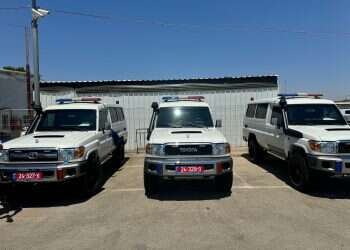Fireworks and ammonium nitrate appear to have been the fuel that ignited a massive explosion that rocked the Lebanese capital of Beirut, experts, and videos of the blast suggest.
The scale of the damage – from the epicenter of the explosion at the port of Beirut to the windows blown out miles away – resembles other blasts involving the chemical compound commonly used as an agricultural fertilizer.
Follow Israel Hayom on Facebook and Twitter
But the compound itself typically doesn't detonate on its own and requires another ignition source. That likely came from a fire that engulfed what initially appeared to be fireworks that were stored at the port.
Online videos of the disaster's initial moments show sparks and lights inside the smoke rising from the blaze, just prior to the massive blast. That likely indicates that fireworks were involved, said Boaz Hayoun, owner of the Tamar Group, an Israeli firm that works closely with the Israeli government on safety and certification issues involving explosives.
"Before the big explosion, you can see in the center of the fire, you can see sparks, you can hear sounds like popcorn and you can hear whistles," Hayoun said. "This is a very specific behavior of fireworks, the visuals, the sounds, and the transformation from a slow burn to a massive explosion."
Jeffrey Lewis, a missile expert at the Middlebury Institute of International Studies in Monterey, California, offered a similar assessment.
"It looks like an accident," Lewis said. "First, there was a fire preceding the explosion, which is not an attack. And some of the videos show munitions what I could call popcorning, exploding like 'pop, pop, pop, pop.'"
He added that "it's very common to see fires detonate explosives."
"If you have a fire raging next to something explosive, and you don't put it out, it blows up," he said.
The white cloud that accompanied the massive blast appeared to be a condensation cloud, often common in massive explosions in humid conditions that can follow the shock waves of an explosion, Lewis said.
Orange clouds also followed the blast, likely from toxic nitrogen dioxide gas that's released after an explosion involving nitrates.
Experts typically determine the power of the blast by measuring the crater left behind, which appeared massive in aerial footage shot on Wednesday morning.
The Beirut blast, based on the crater and glass windows being blown out a distance away, exploded with the force equivalent to detonating at least 2.2 kilotons of TNT, said Sim Tack, an analyst and weapons expert at the Texas-based private intelligence firm Stratfor.
What initially started the fire at the port remains unclear.
Lebanese Interior Minister Mohammed Fahmi, in comments to a local TV station, made no mention of ignited fireworks but said it appeared the blast was caused by the detonation of more than 2,700 tons of ammonium nitrate that had been stored in a warehouse at the dock ever since it was confiscated from a cargo ship in 2014. That amount could cause the explosive force seen in the blast Tuesday, Tack said.
Based on the timeline and the size of the cargo, that ship could be the MV Rhosus. The ship was initially seized in Beirut in 2013 when it entered the port due to technical problems, according to lawyers involved in the case. It came from the nation of Georgia, and had been bound for Mozambique.
"Owing to the risks associated with retaining the ammonium nitrate on board the vessel, the port authorities discharged the cargo onto the port's warehouses," the lawyers wrote in a 2015 article published by shiparrested.com. "The vessel and cargo remain to date in port awaiting auctioning and/or proper disposal."
It remains unclear what conditions the ammonium nitrate had been stored in – or why tons of an explosive chemical compound had been left there for years. Lebanon already was on the brink of collapse amid a severe economic crisis that has ignited mass protests in recent months.
Subscribe to Israel Hayom's daily newsletter and never miss our top stories!
The devastation surrounding the port resembled other ammonium nitrate explosions, such as the 1995 Oklahoma City bombing and a 1947 ship explosion that struck Texas City, Texas.
It also is unclear what conditions a possible shipment of fireworks at the port had been stored in. Fireworks are very common in Lebanon, used to celebrate religious occasions and weddings.
While military explosives are generally safe to transport, common "cheap pyrotechnics" made in China are often of very low quality and can ignite very easily, especially in hot weather, said Hayoun, the Israeli explosives expert.
The "end result," he added is that "hundreds of tons of energetic materials" were detonated to create an explosion of this magnitude.
"It started definitely with fireworks," he said.




